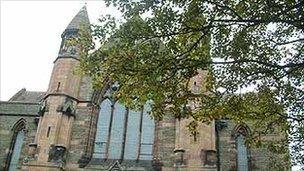Church in Wales consultation to 'reimagine' its purpose
- Published

Some churches such as St Paul's in Grangetown, Cardiff, face repair bills of up to £1m
The Church in Wales has to "reimagine" its purpose as it approaches its centenary, according to a bishop.
The first of six public meetings takes place in Carmarthen later on Tuesday as part of a wide-ranging review.
Bishop of Bangor Andrew John says the church needs to use its stock of buildings more creatively and adapt to better serve modern Wales.
"If all that we do is concentrate on a Sunday we're missing a trick or two," he said.
'Significant change'
A review led by the former Bishop of Oxford, Lord Harries, is already under way into how the Church in Wales should restructure and reinvent itself in time for its centenary in 2020.
The Archbishop of Wales, Dr Barry Morgan, urged officials to be open to "significant change" when he launched the review in April.
Public meetings in the six dioceses in November and January will give worshippers and other interested parties the opportunity to share their views on the church's future direction.
A team of consultants will generate a plan for change based on responses received during the review.
Figures from the Church in Wales show that while adult membership had fallen by almost two thirds since numbers were first recorded in 1959, the number of churches has fallen by less than a quarter.
Mr John told BBC Radio Wales the church had to recognise the challenge of staying relevant to modern Wales in the face of declining attendances and falling income.
"We've got too many buildings - we have to be honest about that," he said.
"They're extremely expensive to run - we know there are countless other chapels in most of our towns and villages. We need to think creatively about the way in which we share our buildings with others.
"We also need to look at the way in which we fund ministry," he added.
"At the moment about 80% of what the church raises goes towards stipendiary ministry - there's less of that coming so we need to be quite creative about the way in which we do that.
"But perhaps the biggest challenge of all is to reimagine what good ministry to the people of Wales might look like today."
Broader mission
Projects such as a food bank in Bangor and work with drug addicts on Anglesey were examples of ways in which the church was involving itself more widely in the community, the bishop said.
"The church has to redescribe what good news looks like - if it's only about Sunday attendance then we haven't understood what all this is all about," he said.
Mr John said he believed the church had an advantage over its counterpart in England in being "slightly removed" from government, and hoped that people would respond to its invitation to discuss the future.
"It's really important that the Church in Wales does engage and asks people 'what is your vision, what do you want the church to look like' as we approach this milestone in the life of the Church in Wales," he said.
"I'm hopeful that these discussions will set the agenda for the next ten, twenty years and beyond."
In February, the Church in Wales revealed that it needed £12m a year to repair its 1,000 listed churches.
But proposals to close church buildings have occasionally proved controversial.
Worshippers in the south Wales valleys staged a sit-in at All Saints Church in Maerdy in July to prevent its closure, eventually striking an agreement to buy the building for £1,000.
- Published27 April 2011
- Published23 February 2011
- Published2 August 2011
- Published9 December 2010